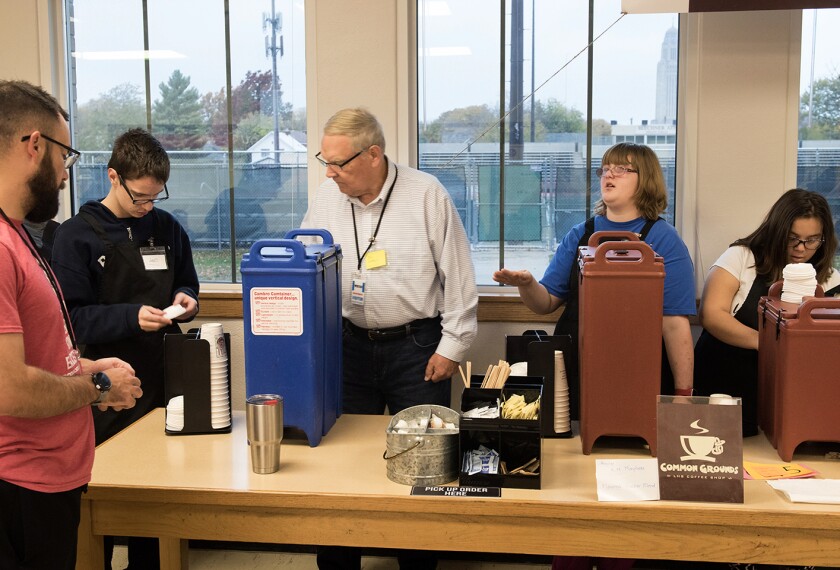Teach For All, a global network of organizations in 34 countries that recruits young professionals to work in high-need schools, has launched a two-year fellowship program that will train teacher-coaches from the United States and other countries in how to work with students who have “learning differences.”
Though part of the fellowship will focus on children with identified disabilities, the use of the term “learning differences” is deliberate and is meant to demonstrate a broader philosophy about student learning, said Rachel Brody, the managing director of Teach For America’s Special Education and Ability Initiative and one of the fellowship’s facilitators.
“We came to the decision to focus very heavily on high expectations,” Ms. Brody said. “For every single kid we work with, we’re going to focus on the high expectations for them.”
Familiar Approach
Wendy Kopp, the founder of Teach For America, is a co-founder of Teach For All, which was established in 2007. The organizations in the Teach for All network follow a similar approach to Teach For America, by recruiting mostly new college graduates who, after a short training period, work for two years in schools that have a high population of disadvantaged children. The Learning Differences Fellowship is also sponsored by the Geneva-based Oak Foundation, which supports students with learning differences as one of its main focus areas.
The 15 fellows, including three Americans, kicked off the fellowship the first week of September with a weeklong trip to Nepal, where they visited schools in rural villages around the capital, Kathmandu. During most of the remaining two years, the fellows will interact with each other virtually, and plan to come together for an additional in-person trip. The fellowship will be spent learning about different student learning styles, appropriate teacher training, and the impact that teachers can have on students.
The fellows will also be expected to produce their own resources and develop case studies that can be shared with the participants and, eventually, with teacher-coaches across the Teach For All Network. In addition to the United States, fellows were selected from Argentina, Australia, China, Ecuador, India, Malaysia, Mexico, Nepal, Pakistan, the Philippines, Spain, and Qatar.
UNESCO estimates that 90 percent of children with disabilities in developing countries do not attend school. That’s despite the fact that the Convention on the Rights of Persons with Disabilities, ratified by 148 countries (but not the United States), specifies that people with disabilities should not be excluded from free and compulsory primary education, or from secondary education, on the basis of that disability.
The fellows come to the program with ambitious plans.
Gustavo Rojas Ayala, 29, a coach for the one-year-old Enseña por Mexico (Teach for Mexico) program, said that he struggled with reading and writing as a young child, and was grateful to a teacher who spent extra time with him. That personal experience, plus two years spent teaching at a secondary school for girls in rural Chile, was part of his motivation for applying for the fellowship.
The school where he taught had no entrance exam, Mr. Rojas said, so he learned “it’s really important to integrate kids. We understood clearly that we had to work with every single student.” But there were students who struggled to learn to read and write and had made it all the way to their teens without gaining those skills. Adding to his challenge as a teacher were classes that sometimes had 50 pupils.
Mr. Rojas, a native of Chile, said he dreams of creating a school that supports inclusive education. “I’m really excited about the opportunity to learn globally,” he said.
Breaking the Cycle
Amrit Poudel, a teacher-coach for Teach For Nepal, wrote an essay as part of his fellowship application about a 19-year-old student with a facility for creative writing and public speaking who still struggled to pass his math exam. Every year, the student would return his math tests with 50 Nepalese rupees—about 50 cents—and the teacher would promote him to the next grade.
When the student enrolled in a class taught by a Teach For Nepal instructor, that teacher turned to Mr. Poudel for help. Together, they mapped out a plan to help the student with math, even though other teachers in the school were saying the instructor’s time would be better spent on other students. Eventually, the student grew comfortable enough to pass his test.
In an email interview, Mr. Poudel, 41, said that teachers in Nepal are generally not well-equipped to handle learning differences.
“Largely, Nepali education considers a one-size-fits-for-all notion of teaching. So, [many children are] dropping out of schools because of different learning styles,” he said.
This fellowship will offer a chance for him to help break that cycle, he said: “I will have chance to construct a framework to help to understand how children learn.”




